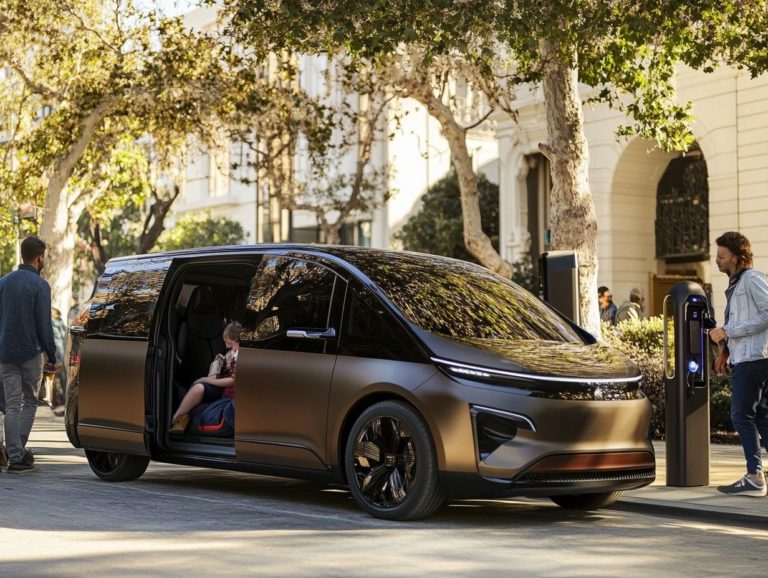56. the benefits of electric vehicle recycling
Electric vehicle recycling is an emerging field. It offers a unique opportunity to protect the environment while fostering economic and social advancement.
As electric vehicles (EVs) gain traction, understanding the recycling process becomes essential for maximizing their benefits. This exploration delves into the environmental advantages, such as reducing carbon footprints and minimizing landfill waste, while also highlighting the economic impacts, including job creation and resource conservation.
Join us in exploring the exciting world of electric vehicle recycling and see how you can make a difference! You ll discover the social benefits, the intricacies of the recycling process, and the challenges associated with battery disposal. We will reveal the multifaceted advantages of electric vehicle recycling and its crucial role in shaping a sustainable future.
Contents
- Key Takeaways:
- Environmental Benefits
- Economic Benefits
- Social Benefits
- The Process of Electric Vehicle Recycling
- Challenges and Solutions
- Frequently Asked Questions
- 1. What does it mean to recycle electric vehicles?
- 2. Why should I consider recycling my electric vehicle?
- 3. What are the environmental benefits of electric vehicle recycling?
- 4. Can electric vehicle recycling help create new jobs?
- 5. What happens to the components of an electric vehicle during the recycling process?
- 6. Is there a market for recycled electric vehicle components?
Key Takeaways:
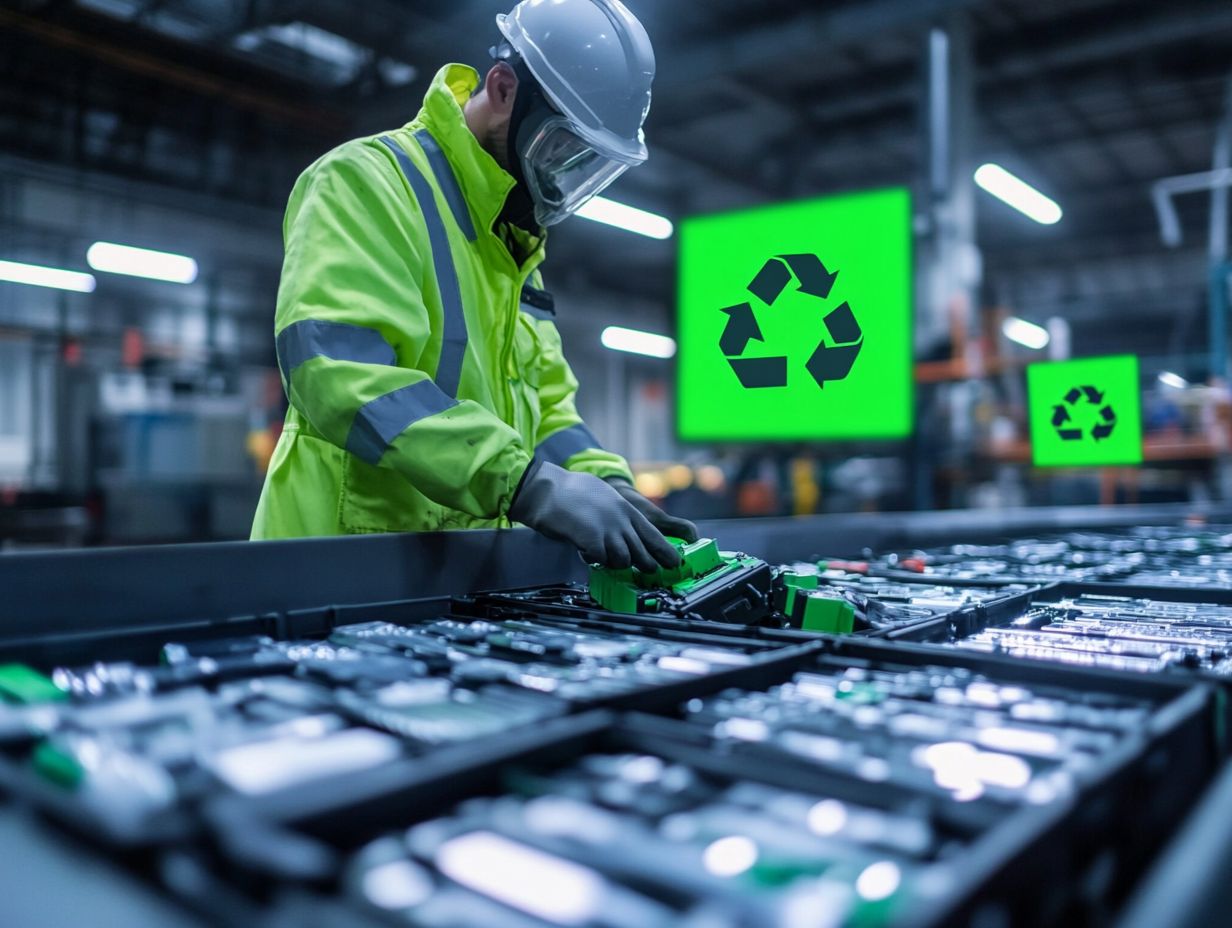
Electric vehicle recycling reduces carbon footprints and minimizes landfill waste, contributing to a healthier environment. It creates jobs and reduces dependence on natural resources, leading to economic benefits. By improving public health and increasing accessibility to electric vehicles, society as a whole gains from the recycling of these vehicles.
What is Electric Vehicle Recycling?
Electric vehicle recycling involves processes and practices that reclaim valuable materials from electric vehicles, especially those with batteries commonly used in electric vehicles. This is crucial for reducing e-waste and helping our planet.
As you witness the growing popularity of electric vehicles brands like Tesla, Ford, and Audi leading the charge the significance of recycling these components to lessen their environmental impact becomes vital.
This practice allows you to retrieve precious metals like lithium, cobalt, and nickel from batteries. It addresses the broader challenge of sustainable material management in automotive manufacturing.
When automotive companies prioritize electric vehicle recycling, they demonstrate a commitment to reusing materials for new products. Beyond just batteries, plastics, aluminum, and steel can be recycled effectively, dramatically reducing the amount of e-waste that ends up in landfills.
By employing innovative recycling methods, the EV industry can champion environmental stewardship and contribute to a more sustainable future. Responsible end-of-life management is just as crucial as the production process itself.
Environmental Benefits
The environmental benefits of recycling electric vehicles are substantial. By engaging in this practice, you significantly reduce greenhouse gas emissions and help mitigate the carbon footprint linked to traditional vehicles especially those powered by internal combustion engines.
These conventional vehicles contribute to climate change and air pollution. Your commitment to recycling electric vehicles plays a crucial role in combating these pressing issues.
Reducing Carbon Footprint
Reducing your carbon footprint is an essential part of the shift toward electric vehicles. These vehicles cut greenhouse gas emissions when compared to traditional gasoline-powered ones, playing a vital role in global sustainability efforts to combat climate change.
By embracing electric vehicle recycling, you enhance the life cycle of batteries and materials. This minimizes waste and optimizes resource use. Research from the International Council on Clean Transportation suggests that widespread adoption of electric vehicles could reduce greenhouse gas emissions by as much as 50% by 2030.
This highlights the immediate advantages of electric mobility and emphasizes the necessity of well-structured recycling programs. These programs recover valuable materials like lithium and cobalt, which are crucial for new batteries.
As you and others transition to electric vehicles, the collective environmental benefits become a powerful force for sustainable transportation solutions, ultimately leading to a cleaner, healthier planet.
Minimizing Landfill Waste
Minimizing landfill waste is a key benefit of electric vehicle recycling. It helps prevent hazardous materials from polluting landfills and promotes sustainable waste management, particularly for lithium-ion batteries.
By reclaiming valuable materials like lithium, cobalt, and nickel, recycling initiatives reduce the demand for new raw materials. This significantly lessens the environmental impact associated with mining activities.
Improper disposal of lithium-ion batteries poses serious risks, including pollution and fire hazards. This highlights the urgent need for responsible recycling solutions.
Embracing sustainable practices in the automotive industry is essential. It ensures that these components are managed appropriately at the end of their lifecycle, safeguarding both the environment and public health.
Economic Benefits
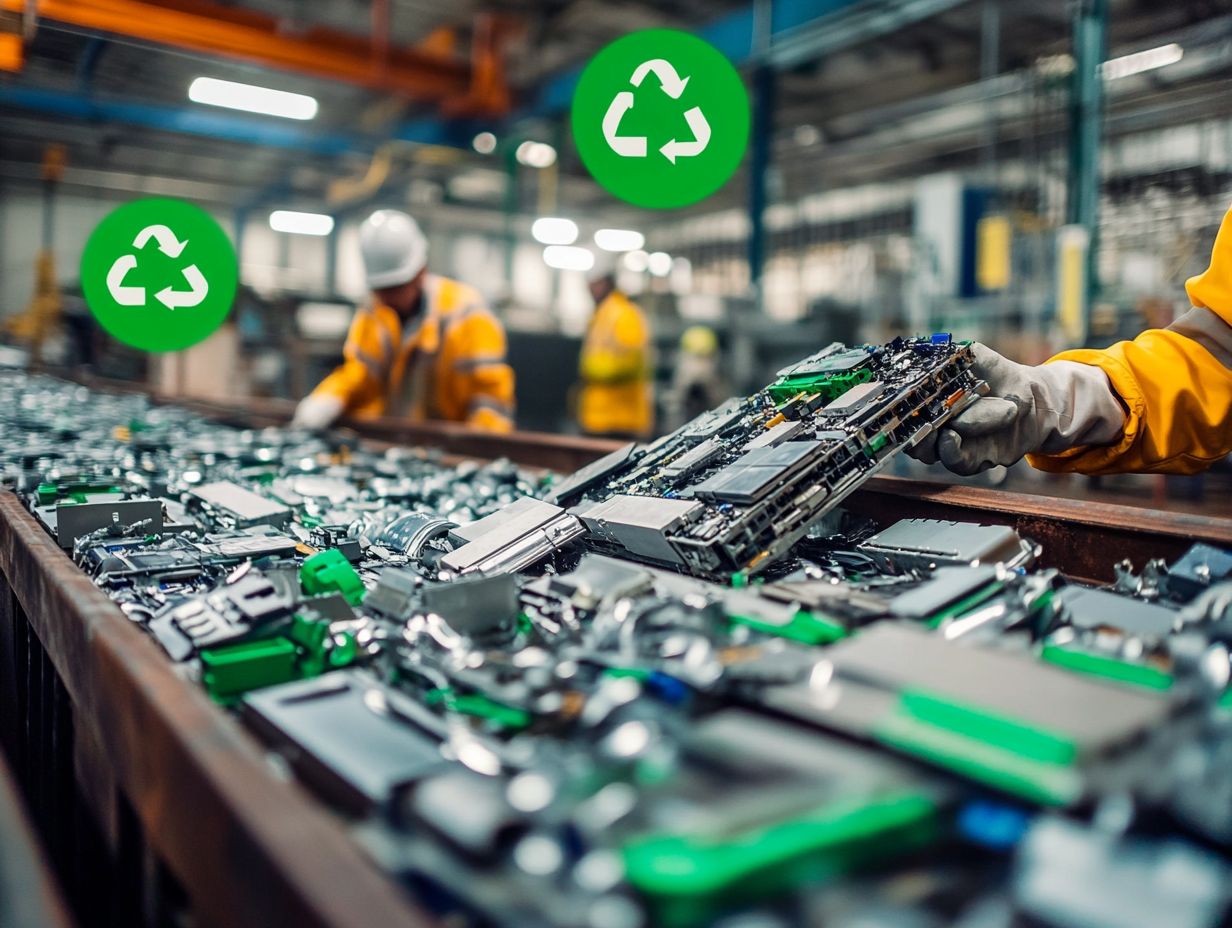
The economic advantages of electric vehicle recycling are numerous. It provides opportunities to create jobs within the recycling sector while decreasing reliance on natural resources.
This is especially vital as the electric vehicle industry expands, with major automotive players like Tesla, Ford, and General Motors leading the way.
Creating Jobs
Creating jobs is a significant economic advantage of electric vehicle recycling. As the demand for sustainable practices in the EV industry grows, numerous employment opportunities are emerging across automotive companies and recycling facilities.
The recycling sector is evolving rapidly, leading to diverse roles that cater to various skills and expertise. You might consider technical positions in recycling plants, where specialists extract valuable materials from old batteries.
You could also explore logistics roles, managing complex supply chains involved in transporting these vehicles and their components. Management opportunities are flourishing too, as companies seek leaders to oversee operations and ensure compliance with environmental regulations.
Notable players in this field, like Li-Cycle and Redwood Materials, are setting benchmarks for innovation and sustainability, showcasing the potential for job growth.
The growing electric vehicle industry creates an urgent need for skilled workers! This will significantly contribute to economic development and the creation of green jobs.
Reducing Dependence on Natural Resources
Reducing your dependence on natural resources is a crucial benefit of electric vehicle recycling. This approach lets you reclaim valuable materials from lithium-ion batteries, enhancing sustainability efforts while promoting responsible resource management.
This practice meets the increasing demand for essential components such as lithium, cobalt, and nickel and significantly mitigates the environmental impact tied to mining these resources.
For instance, studies show that recycling can recover up to 95% of lithium and cobalt from used batteries. This effectively reduces the need for new mineral extraction by nearly one-third.
Consider this: if electric vehicle recycling processes were implemented globally, we could see a reduction in carbon emissions by about 50 million tons each year.
By adopting this circular economy model, you can help pave the way toward a greener and more sustainable future.
Social Benefits
The social benefits of electric vehicle recycling go far beyond environmental and economic considerations.
They play a pivotal role in enhancing public health by diminishing air pollution. This practice also makes electric vehicles more accessible to a wider demographic.
By embracing electric vehicle recycling, you contribute to a cleaner, healthier community while ensuring innovative transportation solutions reach those who need them most.
Improving Public Health
Imagine breathing cleaner air that’s one of the incredible benefits of recycling electric vehicles!
Switching to electric vehicles drastically cuts down on air pollution. This helps reduce health risks, especially in crowded cities.
Studies show that electric vehicles produce zero tailpipe emissions. This could lead to fewer respiratory and heart diseases linked to poor air quality.
For instance, research from the American Lung Association reveals that switching to electric vehicles might prevent about 6,300 premature deaths each year!
Cities that adopt electric vehicle initiatives see fewer asthma-related hospital visits. This shows a clear link between reduced pollutants and better health for residents.
By embracing electric transportation, communities can improve their environment and promote healthier lifestyles.
Increasing Accessibility to Electric Vehicles
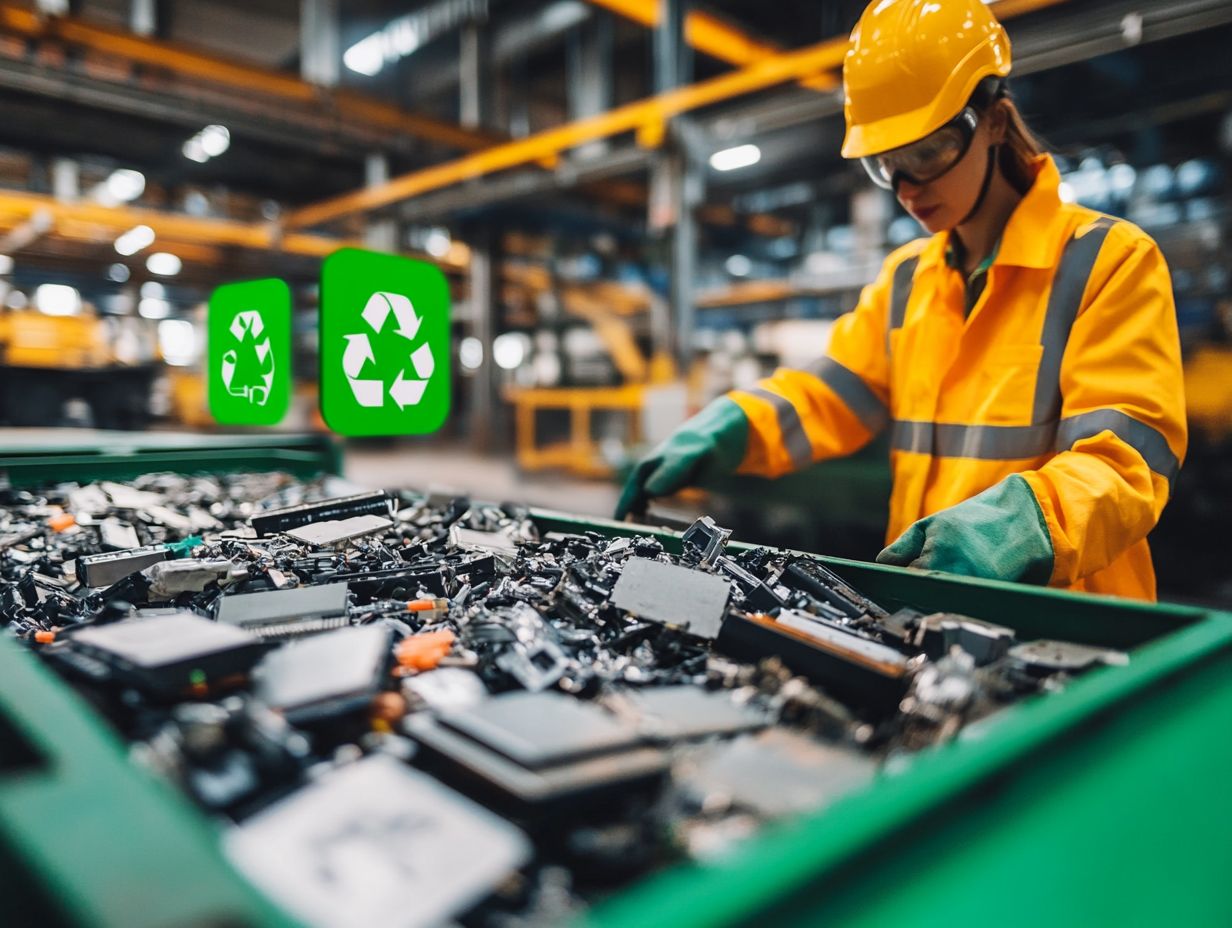
Act now to ensure everyone can enjoy the benefits of electric vehicles! Increasing accessibility to electric vehicles is crucial for ensuring that the advantages of the EV industry reach a diverse population.
To achieve this, employ various strategies, such as advocating for government incentives that make electric vehicle purchases more financially viable for low-income households.
Community programs that educate residents about the benefits of EVs and offer resources for charging station installation also play a pivotal role.
Forming partnerships with automotive companies can lead to innovative solutions tailored to meet the needs of different demographics.
By embracing inclusivity in the transition to electric vehicles, you pave the way for a sustainable future that benefits everyone, regardless of socioeconomic status.
The Process of Electric Vehicle Recycling
The process of recycling electric vehicles involves several clear steps aimed at reclaiming and repurposing valuable materials from lithium-ion batteries.
This approach addresses challenges associated with e-waste while ensuring compliance with regulations established by automotive companies.
Steps and Techniques Involved
The steps and techniques in electric vehicle recycling are vital for effective battery recycling, especially for lithium-ion batteries. These batteries require specialized methods to manage and recover valuable materials from e-waste.
The process typically starts with mechanical separation. Here, materials are physically broken down and sorted to extract components like metals, plastics, and hazardous substances.
Next, methods that use water and chemicals to extract metals come into play. They selectively dissolve and retrieve precious metals such as cobalt, nickel, and lithium.
Safe handling during these stages is crucial; improper management can lead to environmental contamination and safety hazards.
Employing advanced recycling techniques helps recover valuable resources and contributes to sustainable practices, minimizing waste and reducing the need for new raw materials.
Challenges and Solutions
The challenges and solutions associated with electric vehicle recycling are complex. You face issues ranging from battery disposal and e-waste management to the pressing need for automotive companies to adapt to changing regulations.
Navigating this intricate landscape requires a strategic approach, as each element plays a vital role in the sustainability of electric vehicle technology.
Addressing Battery Disposal and Recycling Issues
Addressing battery disposal and recycling issues is vital for the future of electric vehicles. Improper handling of lithium-ion batteries poses environmental and safety hazards.
As demand for electric vehicles rises, managing used lithium-ion batteries becomes more pressing. If not disposed of properly, these batteries can leak harmful substances into the environment, risking ecosystems and human health.
Innovative recycling solutions help reduce these dangers, emphasizing the importance of reclaiming valuable materials like lithium and cobalt. Companies like Tesla and BMW lead the way, pioneering effective recycling methods to recover essential components from spent batteries.
This creates a circular economy that cuts down on waste and is exciting for our planet! It also reduces the need for raw material extraction, ensuring a more sustainable future for all.
Frequently Asked Questions
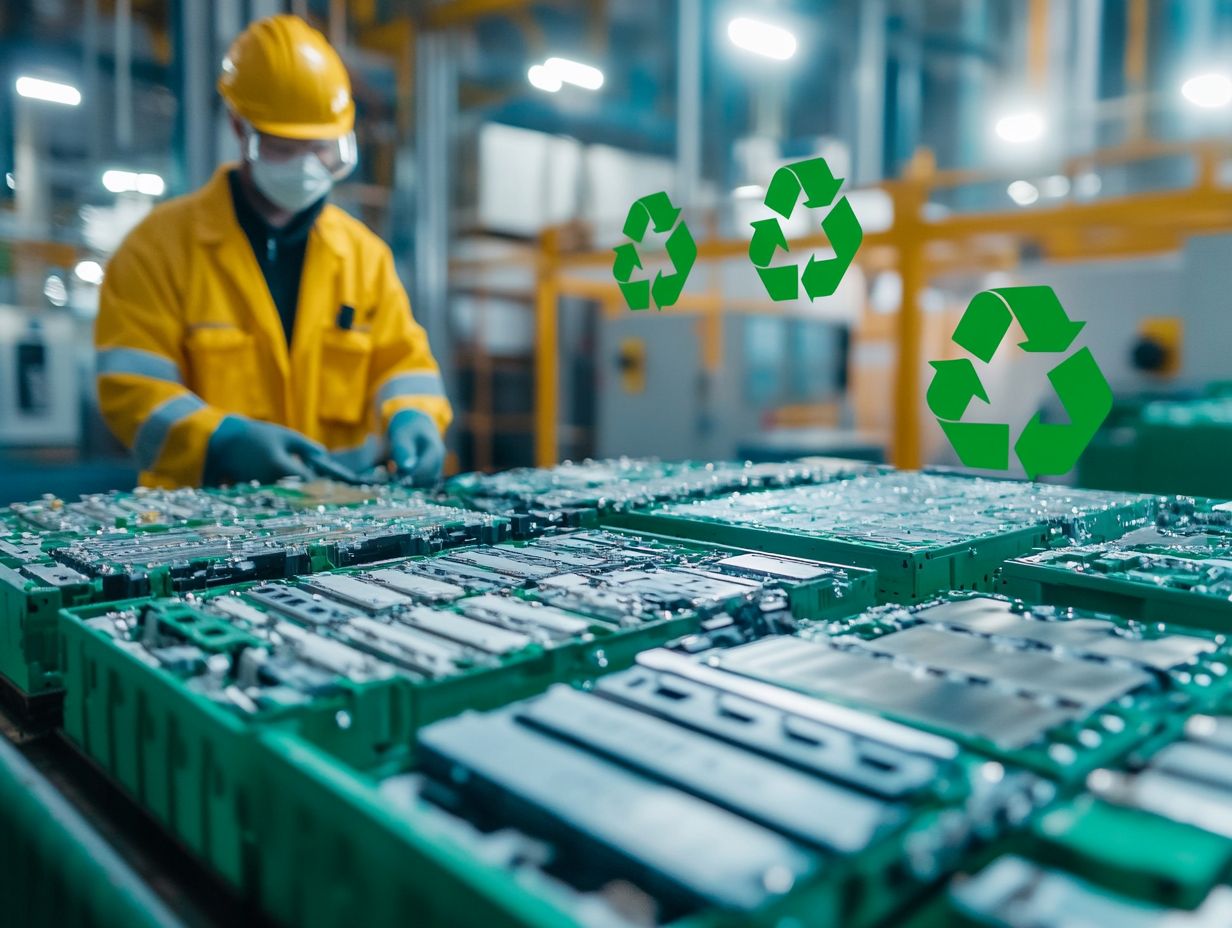
1. What does it mean to recycle electric vehicles?
Electric vehicle recycling involves dismantling old or damaged electric vehicles and reusing or recycling their components for other purposes.
2. Why should I consider recycling my electric vehicle?
Recycling your electric vehicle has numerous benefits for the environment and society. It reduces the demand for new materials, decreases carbon emissions, and supports the growth of sustainable industries.
3. What are the environmental benefits of electric vehicle recycling?
Electric vehicle recycling helps reduce the exploitation of natural resources, lowers greenhouse gas emissions, and minimizes pollution caused by the extraction and processing of raw materials.
4. Can electric vehicle recycling help create new jobs?
Yes, electric vehicle recycling can create new jobs in the recycling and manufacturing industries. It supports the growth of a circular economy, promoting job creation and economic development.
5. What happens to the components of an electric vehicle during the recycling process?
The components of an electric vehicle are dismantled, and reusable parts are salvaged for use in other vehicles or industries. The remaining materials are recycled, including batteries, which can be transformed into new batteries or used for energy storage.
6. Is there a market for recycled electric vehicle components?
Yes, there is a growing market for recycled electric vehicle components. Many automakers are now using recycled materials in their new vehicles, with increasing demand for sustainable products across various industries.
If you’re interested in learning more about electric vehicle recycling or want to take steps towards sustainability, consider exploring local recycling programs or contacting car manufacturers for more information.

